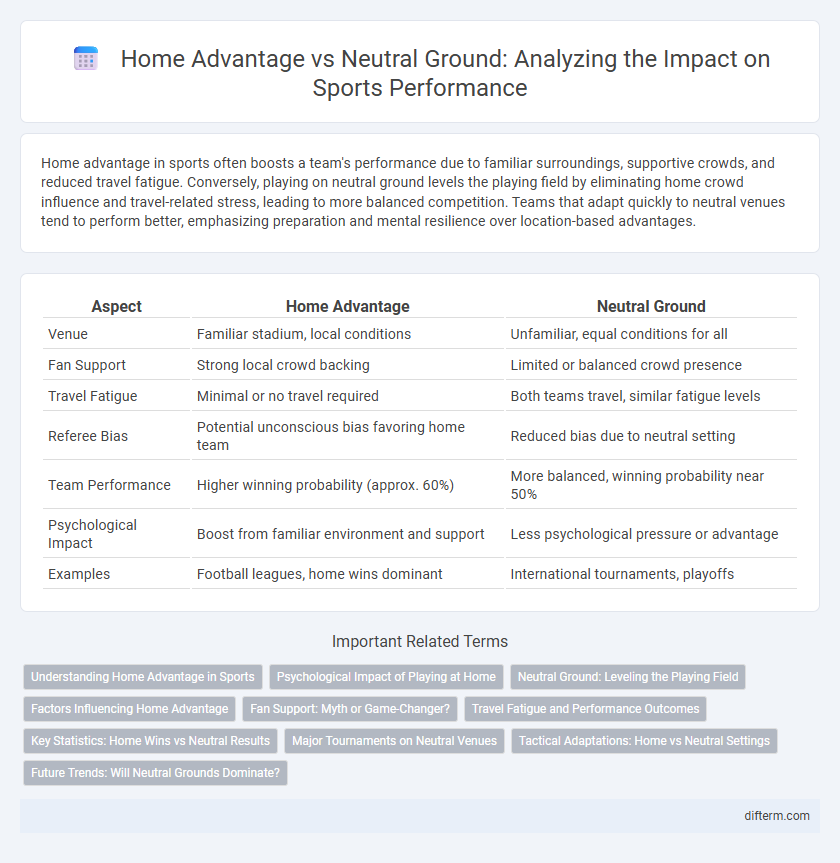Home advantage in sports often boosts a team's performance due to familiar surroundings, supportive crowds, and reduced travel fatigue. Conversely, playing on neutral ground levels the playing field by eliminating home crowd influence and travel-related stress, leading to more balanced competition. Teams that adapt quickly to neutral venues tend to perform better, emphasizing preparation and mental resilience over location-based advantages.
Table of Comparison
| Aspect | Home Advantage | Neutral Ground |
|---|---|---|
| Venue | Familiar stadium, local conditions | Unfamiliar, equal conditions for all |
| Fan Support | Strong local crowd backing | Limited or balanced crowd presence |
| Travel Fatigue | Minimal or no travel required | Both teams travel, similar fatigue levels |
| Referee Bias | Potential unconscious bias favoring home team | Reduced bias due to neutral setting |
| Team Performance | Higher winning probability (approx. 60%) | More balanced, winning probability near 50% |
| Psychological Impact | Boost from familiar environment and support | Less psychological pressure or advantage |
| Examples | Football leagues, home wins dominant | International tournaments, playoffs |
Understanding Home Advantage in Sports
Home advantage in sports significantly influences team performance through crowd support, familiar surroundings, and reduced travel fatigue. Studies show that home teams win approximately 60% of matches across various sports, highlighting the psychological and physiological benefits of playing on home turf. Factors such as referee bias, pitch conditions, and pre-match routines further amplify the competitive edge for home teams compared to neutral ground scenarios.
Psychological Impact of Playing at Home
Playing at home significantly boosts athletes' confidence and motivation due to familiar surroundings and supportive crowds, enhancing their overall performance. The psychological comfort derived from routine environments reduces anxiety and stress levels, allowing players to focus better on their tasks. Research consistently shows that home teams benefit from increased aggression and risk-taking, driven by a sense of territoriality and social support.
Neutral Ground: Leveling the Playing Field
Playing on neutral ground removes the influence of home crowd support and familiar surroundings, allowing teams to compete under equal conditions. Statistical analyses reveal that home advantage often boosts a team's performance by up to 20%, a benefit that disappears in neutral settings. This leveling effect promotes fairness and highlights pure skill and strategy during high-stakes matches.
Factors Influencing Home Advantage
Home advantage in sports is influenced by factors such as crowd support, familiar playing conditions, and reduced travel fatigue, which enhance athlete performance. The psychological boost from enthusiastic home fans often increases player motivation and confidence. Environmental familiarity, including climate and altitude, also contributes to better tactical execution and physical readiness.
Fan Support: Myth or Game-Changer?
Fan support significantly influences athletes' performance by boosting morale and creating a psychologically intimidating atmosphere for opponents, often tipping the scales in favor of the home team. Studies in sports psychology confirm that passionate crowds can elevate player focus and energy levels, directly correlating with improved outcomes. While neutral grounds eliminate fan bias, the absence of this emotional stimulus can lead to a less dynamic contest, underscoring fan support as a crucial factor rather than a mere myth in home advantage dynamics.
Travel Fatigue and Performance Outcomes
Travel fatigue significantly impacts athlete performance, with players often exhibiting decreased physical output and slower reaction times when competing away from their home venue. Studies indicate that teams playing on neutral ground face reduced home advantage benefits, as diminished travel strain leads to more balanced physical and psychological conditions. Consequently, the absence of travel-induced fatigue on neutral sites contributes to closer score margins and unpredictable match outcomes in professional sports competitions.
Key Statistics: Home Wins vs Neutral Results
Home teams win approximately 60% of matches, highlighting the significant impact of familiar environment, crowd support, and minimized travel fatigue on performance. In contrast, games held on neutral grounds see a more balanced outcome, with home advantage factors neutralized, resulting in win rates closer to 50% for either side. This statistical difference emphasizes the critical role of venue selection in competitive sports strategy and match predictions.
Major Tournaments on Neutral Venues
Major tournaments held at neutral venues often level the playing field by minimizing home advantage, which can significantly influence team performance and fan support. Studies show that teams competing at neutral grounds experience fewer psychological pressures from hostile crowds and reduced travel fatigue, leading to more balanced and unpredictable outcomes. Neutral venues are frequently chosen in events like the FIFA World Cup or UEFA Champions League finals to ensure fairness and maximize global viewership.
Tactical Adaptations: Home vs Neutral Settings
Teams adopt distinct tactical adaptations when playing at home versus on neutral grounds, with home advantage often allowing for more aggressive and high-press strategies due to crowd support and familiar conditions. On neutral grounds, coaches tend to prioritize balanced formations and conservative play to mitigate the lack of environmental familiarity and reduce risks associated with aggressive tactics. Statistical analysis reveals that teams show higher possession and pass accuracy metrics at home, highlighting the influence of home advantage on tactical execution.
Future Trends: Will Neutral Grounds Dominate?
Neutral grounds are gaining traction as sports leagues aim to ensure fairness and reduce home advantage biases, with data showing more balanced outcomes in such settings. Advanced analytics predict an increased adoption of neutral venues, particularly in international tournaments and high-stakes playoffs, driven by globalization and the demand for equitable competition. Emerging technologies like virtual crowd noise and dynamic scheduling further support the shift toward neutral grounds dominating future sports formats.
home advantage vs neutral ground Infographic

 difterm.com
difterm.com